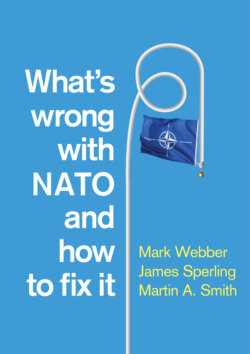Читать книгу What's Wrong with NATO and How to Fix it - Mark Webber - Страница 6
ОглавлениеPreface and Acknowledgements
Writing on matters of contemporary importance always faces the challenge of relevance. How will a book’s analysis and proposals stand up as events carry on regardless of the authors’ prognostications? This is a question we asked ourselves many times as this volume progressed. A book originally conceived in 2013 has had to take on board the Ukraine crisis of 2014; the election of Donald Trump in 2016; Brexit; a major reconfiguration of NATO’s mission in Afghanistan; and the worsening of political order to NATO’s south in the Middle East and North Africa. The manuscript had been drafted by early 2020 with all these events accommodated. Then came the COVID-19 pandemic. For some, this is an event of such magnitude that it amounts to a ‘year zero’ in international politics. If that judgement were true, much of our analysis would have become instantly redundant. It would be like finishing a book on terrorism the week before 9/11. But such a view may well prove false. This is not to minimize the ghastly and extensive effects of COVID-19. Pandemics, by definition are grave, but history suggests that they are also often temporary. Public health interventions, vaccines and acquired immunity could well mean that within a few years the disease is but ‘a disturbing memory’.1 Equally, as Joseph Nye has suggested, the pandemic ‘might not change the world’.2 This may seem a hopelessly optimistic view from the vantage point of November 2020, as COVID-19 marches across the globe. But Nye’s point is a sensible one. The big issue of global politics – the rise of China and America’s adjustment to it – will play out regardless. Equally, NATO’s perennial issues – the ones that have structured this book – will remain. To ignore COVID-19 would, however, have been perverse. In finishing the book, we have thus taken into consideration the evolving landscape of international response, but we have not been deflected from retaining a structure for the book that talks to NATO’s longer-standing issues – those that pre-date the COVID-19 crisis and those that will outlast it. In short, we have dealt with the pandemic as an important, but second-order, issue (the book’s concluding chapter explains how and why). Our thanks are owed here to one external reader who suggested that the pandemic could best be conceived as ‘magnifying’ but not replacing ‘existing trends and fault lines’ facing the Alliance.
Getting the book over the finishing line in such turbulent times owes much to the forbearance of Louise Knight and Inès Boxman at Polity. Their patience in the face of more than one delay in the book’s delivery is much appreciated. The final push was also made possible by the generosity of the University of Birmingham, which afforded Mark Webber an extended sabbatical to complete the writing and editing. In addition, we would like to acknowledge a range of friends, colleagues and interlocutors, all of whom have fed ideas into the analyses (perhaps sometimes unwittingly). Thanks are owed to Derek Averre, Wyn Bowen, Lawrence Chalmer, Malcolm Chalmers, Lorenzo Cladi, Fabrizio Coticchia, Albert Covelli, Adam Crawford, John Deni, David Dunn, Spyros Economides, Nico Faso, Trine Flockhart, Rita Floyd, Alex Garrido, Tim Haughton, Ben Kienzle, David Logan, Sonia Lucarelli, Jennifer Medcalf, Hugo Meijer, Philip Mizen, Alex Moens, Jaimie Orr, Jack Porter, Patrick Porter, Adam Quinn, Jens Ringsmose, Sten Rynning, Jamie Shea, Thierry Tardy, Keery Walker, Nick Wheeler, Richard Whitman, Ben Wilkinson, Michael J. Williams and Katharine Wright. This book sits alongside others published by Polity addressing the question of What’s Wrong with international organizations. Two of these were of some influence in shaping our thinking. We would thus like to thank Simon Hix and Thomas Weiss for their insights on, respectively, the European Union and the United Nations. If these have been transposed wrongly to NATO in any way, the responsibility is ours not theirs.
Finally, a personal note. The book was finalized during what historians might one day refer to as the age of social distancing and lockdown. This meant a lot of time spent with friends and family as homes became offices, and deadlines merged with domestic schedules. The deferred gratification that attends any writing project was intensified in these circumstances. Our thanks are, therefore, owed to Eddie, Della, Joy, Theo, Sheila and Victoria.
Mark Webber, James Sperling and Martin A. Smith November 2020
Notes
1 1. Tom Clark, ‘The Contagion Effect’, Prospect, May 2020, p. 1.
2 2. Joseph S. Nye Jr, ‘COVID-19 Might Not Change the World’, Foreign Policy, 9 October 2020, https://foreignpolicy.com/2020/10/09/covid-19-might-not-change-the-world/.
